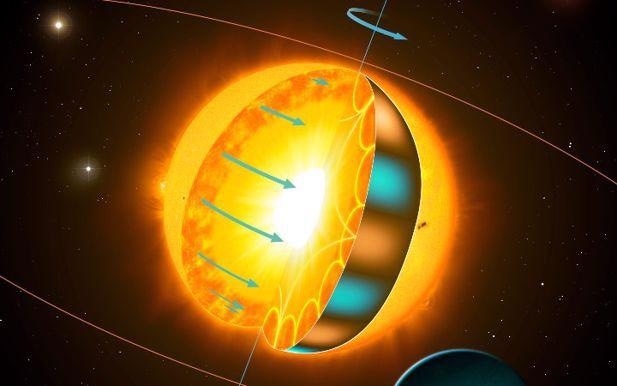
Image Credit: Mark Garlick/University of Birmingham.
All stars that are similar to the Sun are born spinning. With aging, their spin tends to slow down as a result of their magnetic winds in a process known as 'magnetic braking.'
A previous study that was published in 2016 by researchers from Carnegie Observatories provided the first clues that stars at a similar phase of life as the Sun were spinning quicker compared to magnetic braking theories forecasted.
The findings of that study were based on a technique in which researchers locate dark spots on the surface of stars and trace them as they move along with the spin of the stars.
Although the technique has shown to be effective for quantifying spin in younger stars, older stars have had very few starspots, which has rendered the impacts of this 'weakened' magnetic braking on such stars hard to verify.
As part of the new study published in the journal Nature Astronomy, scientists from the University of Birmingham have employed a different method to verify that older stars do seem to rotate quicker than predicted. The researchers used asteroseismology to estimate how the star is rotating.
This comparatively new field of study allows researchers to quantify the oscillations caused by sound waves trapped within the star. By quantifying the various characteristics of such waves, different characteristics of stars like their age or size can be disclosed.
The researchers quantified the modes, or the frequencies, of the sound waves generated by the oscillation of the star. When the star spins, these modes tend to divide into various frequencies.
According to the researchers, this can be visualized as the sound of two ambulances standing still on a roundabout than when they are driving in circles. The measurement of such frequencies enables calculating the rate of spin such that it is possible for both young and old stars.
Although we’ve suspected for some time that older stars rotate faster than magnetic braking theories predict, these new asteroseismic data are the most convincing yet to demonstrate that this ‘weakened magnetic braking’ is actually the case. Models based on young stars suggest that the change in a star’s spin is consistent throughout their lifetime, which is different to what we see in these new data.
Dr Oliver Hall, Study Lead Author, University of Birmingham
The team believes that changes to the magnetic field of the stars could crucial to the variation in momentum loss. Gaining insights into the interaction of the magnetic field with rotation will be an essential area of future study, and is now being investigated by the researchers.
Also, the findings of the study could explain Sun’s activity over the coming several billion years.
These new findings demonstrate that we still have a lot to learn about the future of our own Sun as well as other stars. This work helps place in perspective whether or not we can expect reduced solar activity and harmful space weather in the future. To answer these questions we need better models of solar rotation, and this work takes an important step towards improving the models and supplying the data needed to test them.
Dr Guy Davies, Study Co-Author, University of Birmingham
The European Space Agency (ESA), Aarhus University, University of Hawai’i, Universit´e Paris-Saclay, and the University of Exeter are other contributors to the study.
Journal Reference:
Hall, O. J., et al. (2021) Weakened magnetic braking supported by asteroseismic rotation rates of Kepler dwarfs. Nature Astronomy. doi.org/10.1038/s41550-021-01335-x.